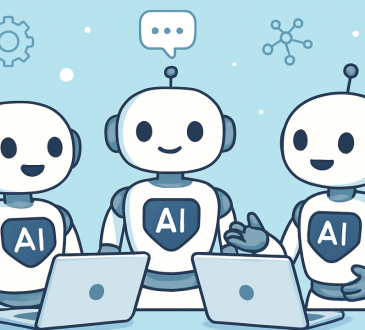AI in Healthcare and Finance: Key Stories in Industry News – April 2025

April 2025 has been a defining month for Artificial Intelligence (AI), especially in two of the world’s most vital sectors — healthcare and finance. Both industries, which depend heavily on accuracy, speed, and trust, are undergoing major transformations powered by intelligent technologies.
From predictive healthcare and precision diagnostics to algorithmic trading and fraud prevention, AI is reshaping how care is delivered and how money moves. This month’s developments have not only highlighted the pace of innovation but also emphasized the need for ethical, transparent, and responsible AI deployment.
Let’s take a closer look at the most significant stories driving AI’s evolution across healthcare and finance in April 2025.
AI in Healthcare: The Rise of Predictive Precision
Healthcare remains one of the most promising frontiers for AI, and April 2025 brought several announcements that could redefine medical practice for the future.
Predicting Diseases Before They Progress
A leading biotech startup, MedSynaptix, unveiled an AI platform that can predict disease progression in chronic illnesses like diabetes and heart failure with over 90% accuracy.
By analyzing patient histories, lifestyle patterns, genetic profiles, and imaging data, this AI system can forecast health outcomes months in advance. This makes it possible for doctors to intervene earlier, personalize treatments, and improve patient recovery rates. Hospitals across the United States and Europe have already begun pilot programs, with promising early results showing fewer readmissions and faster recoveries.
Smarter Imaging and Early Diagnosis
Researchers at Kyoto University in Japan announced a deep learning model that detects early-stage cancers from MRI and CT scans. The system can spot subtle abnormalities often missed by even the most skilled radiologists, reaching near-perfect accuracy in several trials. Experts believe this innovation could help reduce diagnostic delays and improve survival rates through earlier treatment.
AI-Assisted Surgery Becomes Reality
AI-driven robotic systems are now stepping into the operating room. Hospitals in Singapore and Germany recently reported successful trials of robotic arms guided by AI that can autonomously perform parts of complex surgeries, such as spinal and orthopedic procedures, under human supervision. These systems adapt to patient anatomy in real time, offering unmatched precision and faster recovery times.
AI in Global Health and Disease Prevention
AI is also becoming a key player in public health. Global health organizations are using machine learning tools to analyze travel data, weather trends, and social media discussions to predict potential epidemic outbreaks. The World Health Organization expanded its AI-based early warning system this month to monitor and respond to global health risks more proactively — a step forward in post-pandemic preparedness.
Ethics and Regulation in Medical AI
As AI’s role in healthcare expands, ethical concerns continue to rise. Questions about data privacy, bias in medical datasets, and the transparency of algorithmic decisions are sparking intense debate. In April 2025, the European Union proposed a new framework requiring healthcare AI systems to undergo standardized ethical audits before being deployed, setting a potential global standard for safe and responsible innovation.
AI in Finance: Smarter Systems, Safer Transactions
While healthcare is changing how we heal, finance is changing how we manage, invest, and protect our money. In April 2025, new AI-powered financial tools took center stage, offering greater intelligence, personalization, and security across global markets.
AI-Powered Market Predictions
Major investment firms such as BlackRock and JPMorgan introduced upgraded AI systems capable of analyzing real-time market data, geopolitical trends, and even social sentiment to predict stock movements. These advanced models are now being used to complement — and in some cases, outperform — traditional financial analysts.
Personalized Financial Advisors
Fintech innovators like FinWise and AlphaWealth launched AI “wealth companions” that provide customized investment strategies based on a person’s income, goals, and risk tolerance. These tools continuously learn from user behavior, adjusting portfolio advice in real time. For the first time, everyday investors can access the kind of personalized insights once reserved for high-net-worth clients.
Fighting Financial Fraud with AI
AI is also becoming a powerful ally in combating cybercrime. A new report from the Global Financial Security Council revealed that AI-based fraud detection systems have reduced global financial losses by nearly 35% in the past year.
NeoBank Asia has introduced an AI-driven behavioral biometrics tool that tracks how users type, swipe, and navigate digital platforms to identify unusual activity in seconds. This real-time monitoring helps stop fraud before it occurs, creating a safer digital banking experience.
RegTech and Compliance Automation
AI is streamlining compliance through regulatory technology (RegTech). These intelligent tools can automatically scan vast legal documents, update compliance frameworks, and generate audit-ready reports. This not only saves financial institutions time but also reduces the risk of human error in complex regulatory environments.
Ethics, Bias, and Accountability
Despite rapid progress, experts continue to warn about bias in AI-driven financial decision-making. Regulators across the United States and Europe are now calling for “explainable AI” — systems that provide clear reasoning for credit approvals, loan assessments, and investment advice. The goal is to ensure transparency and fairness while maintaining human oversight in critical financial operations.
Bridging the Two Worlds: AI, Data, and Trust
Though healthcare and finance serve different purposes, they share one vital common factor — data. Both sectors rely heavily on sensitive information, making privacy and trust central to AI adoption.
In April 2025, the Global AI Ethics Consortium announced a new collaboration with corporations from both industries to establish universal ethical AI standards. Their guidelines focus on ensuring data protection, transparent decision-making, and responsible model development across all sectors.
Additionally, both industries are investing in federated learning, an AI approach that allows algorithms to learn from distributed datasets without accessing or exposing personal information. This method could become the cornerstone of privacy-preserving AI in the coming decade.




